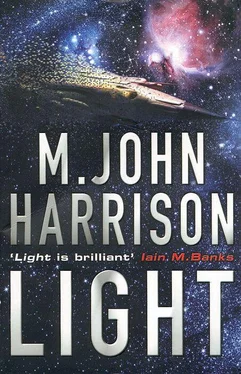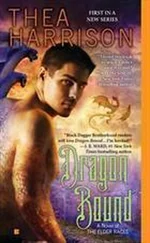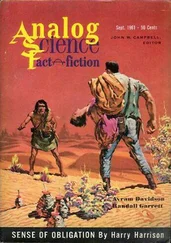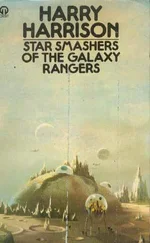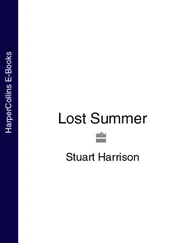'This is such a shitty signal,' it began, followed by something indistinguishable, then: 'The data's useless. And the cats-'
After two or three days things seemed to come to a head for him. 'If you won't come over,' he threatened, 'I'm giving up. I'm sick of dealing with it all.' There was a pause, then: 'Michael? I'm sorry. I know you wanted this to be-'
There were no further calls after that, until the most recent one. And all that said was:
'Kearney?'
There was a background noise like rain falling. Kearney tried to return the call, but Tate's phone seemed to be switched off. When he replayed the original message, he heard behind the rain another noise, like a signal feeding back then swallowing itself abruptly.
'Kearney?' Tate said. Rain and feedback. 'Kearney?' It was hard to describe how tentative he sounded.
Kearney shook his head and put on his coat.
'I knew you'd go out again,' said Anna.
As soon as Kearney let himself in, the black cat, the male, ran up to him, fawning and mewling for attention. But he extended his hand too suddenly, and, lowering its haunches as if he had hit it, it ran off.
'Shh,' said Kearney absently. 'Shh.'
He listened. The temperature and humidity of the suite were supposed to be tightly controlled, but he couldn't hear the fans or the dehumidifiers. He touched a switch and the fluorescents came on, buzzing in the silence. He blinked. Everything but the furniture had been crated up carefully and moved somewhere else. There was plastic packing material scattered over the carpet, along with discarded strips of heat-seal tape. Two damaged cardboard boxes, bearing the logo of a firm called Blaney Research Logistics, lay discarded in a corner. The benches and desks were empty but for the dust which had built up over the months of their occupation, to make circuit-like patterns between the installations.
'Puss?' said Kearney. He drew with his finger in the dust.
On Tate's credenza he found a single yellow Post-it note. There was a phone number, an email address.
'Sorry, Michael,' Tate had scribbled underneath.
Kearney stared around. Everything Gordon Meadows had said about Tate came back to him. It made him shake his head. 'Brian,' he murmured, 'you conniving bastard.' He was almost amused.
Tate had taken his ideas to Sony, with or without the help of MVC-Kaplan. He had clearly been planning it for weeks. But something else had happened here, something less easy to understand. Why had he left the cats? Why had he disconnected the flatscreen displays, then swept them on to the floor and kicked them apart in a rage? You didn't associate Tate with rage. Kearney stirred the pieces with his foot. They had fetched up among the usual litter of junk food wrappers and other refuse, some of which was more than a week old. The cats had been using it as a lavatory. The male was cowering in the wreckage now, staring up at him like a little live gargoyle.
'Shh,' he said.
He reached down more carefully, and this time it rubbed against his hand. Its sides were trembling and emaciated, its head as sharp as an axe, its eyes bulging with opposites-distrust and relief, fear and gratitude. Kearney picked it up and held it close to his chest.
He fondled its ears, called the female cat's name, looked around hopefully. There was no response.
'I know you're here,' he said.
Kearney turned the lights out and sat down on Tate's credenza. He thought that if the female got used to him being there she would eventually come out from wherever she was hiding. Meanwhile, her brother ceased to tremble and began instead to purr, a clattering rumble, disjointed, hoarse as machinery. 'That's a bizarre noise,' Kearney told him, 'for an animal your size.' Then he said: 'I'd imagine he called you Shrodinger in the end. Is that what he called you? Is he that dull?' The cat purred a moment more then stopped and stiffened suddenly. It peered down into the pile of wrecked equipment and burger cartons.
Kearney looked down too.
'Hello?' he whispered.
He was expecting to see the female, and indeed, there was a whitish flicker down near his feet; but it wasn't a cat. It was a quiet spill of light, emerging like fluid from one of the ruptured displays and licking out across the floor towards Kearney's feet. 'Jesus!' he shouted. He jumped up. The male cat made a panicky hissing noise and squirmed out of his arms. He heard it hit the floor and run off into the dark. Light continued to pour out of the broken screen, a million points of light which shoaled round his feet in a cold fractal dance, scaling into the shape he most feared. Each point, he knew-and every point which comprised it, and every point which comprised the point before that-would also make the same shape. 'There is always more,' Kearney whispered. 'There is always more after that.' He threw up suddenly: staggered away, bumping into things in the dark, until he found the outside door.
It hadn't been rage that made Tate destroy the equipment; it had been fear. Kearney ran into the street without looking back.
SEVENTEEN
The Lost Entradas
Human beings, hooked by the mystery of the Kefahuchi Tract, arrived on its doorstep two hundred years after they got into space.
They were arrant newcomers, driven by the nouveau enthusiasms of a cowboy economy. They had no idea what they had come for, or how to get it: they only knew they would. They had no idea how to comport themselves. They sensed there was money to be made. They dived right in. They started wars. They stunned into passivity five of the alien races they found in possession of the galaxy and fought the sixth -- which they called 'the Nastic' out of a mistranslation of the Nastic's word for 'space'-to a wary truce. After that they fought one another.
Behind all this bad behaviour was an insecurity magnificent in scope, metaphysical in nature. Space was big, and the boys from Earth were awed despite themselves by the things they found there: but worse, their science was in a mess. Every race they met on their way through the Core had a star drive based on a different theory. All those theories worked, even when they ruled out one another's basic assumptions. You could travel between the stars, it began to seem, by assuming anything. If your theory gave you a foamy space to work with -if you had to catch a wave-that didn't preclude some other engine, running on a perfectly smooth Einsteinian surface, from surfing the same tranche of empty space. It was even possible to build drives on the basis of superstring-style theories, which, despite their promise four hundred years ago had never really worked at all.
It was affronting to discover that. So when they fetched up on the edge of the Tract, looked it in the eye, and began to despatch their doomed entradas, the Earthlings were hoping to find, among other things, some answers. They wondered why the universe, which seemed so harsh on top, was underneath so pliable. Anything worked. Wherever you looked, you found. They were hoping to find out why. And while the entradistas were dying in ways no one could imagine, crushed, fried, expanded or reduced to mists of particles by the Tract itself, lesser hearts took with enthusiasm to the Beach, where they found Radio Bay. They found new technologies. They found the remains of ancient races, which they ragged about like bull terrier pups with an old bone.
They found artificial suns.
There had been, some time in the deep past, such a premium on the space closest to the Tract that there were more artificial suns in the Radio Bay cluster than natural ones. Some had been towed in from other locations; others had been built from scratch, in situ. Planets had been steered into place around them, and inserted into unnatural orbits designed to keep the Tract in maximum view. Ferociously goosed magnetic fields and ramped-up atmospheres protected them from radiation. Between the planets, under the sleets of raging light, rogue moons wove their way, in fantastically complex orbits.
Читать дальше
